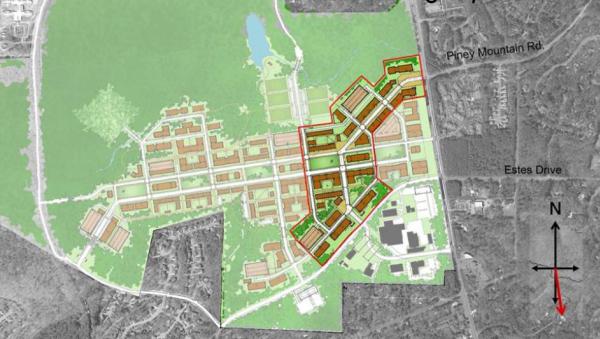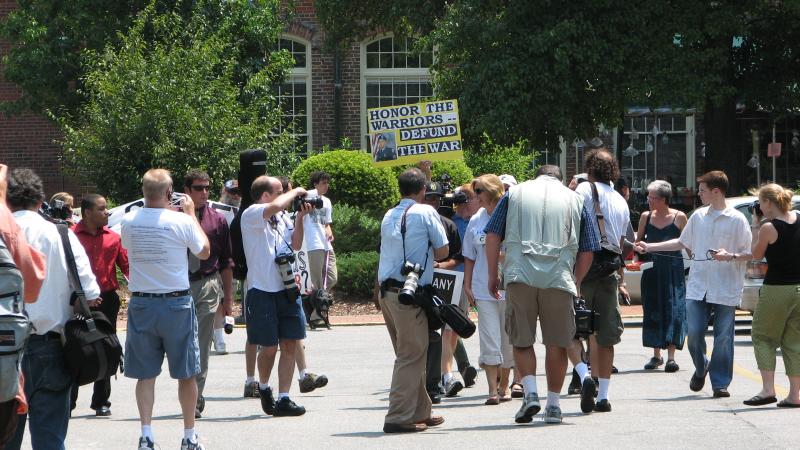As I predicted (“Carolina North: What’s Next?”) last week, the Carrboro Citizen is reporting that UNC is prepared to move the Carolina North Innovation Center north of Estes to sit roughly on the Town’s former municipal services site.
Not a hard guess given UNC’s Jack Evans recent comments.
…one indication that the university is intent on the timetable is a related matter on the trustees agenda — the shift of a proposed site for an 80,000-square-foot Innovation Center from the south side of Estes Drive Extension to an area just off Municipal Drive near the Town of Chapel Hill’s former Public Works facility.
Earlier this month, Jack Evans, Carolina North’s executive director, said that the area would likely be in the very first phases of construction. In addition to being already cleared and served by utilities, the site also avoids a potential conflict over the closing of Horace Williams Airport. University officials have said they’d like to close the airport as soon as a new facility is ready for its Medical Air operations. But that idea has met resistance in the North Carolina General Assembly.
While the first 15-year phase of the Carolina North plans include using sections of the current airport runway near Martin Luther King Jr. Boulevard, the site for the innovations center is out of the way of the airport approach.
At the last community outreach session, the reported [PDF] size of the facility was 85,000 square/feet not 80,000 as the CarrboroCitizen reports. I’m not sure if there’s been a shift.

Click to Enlarge
What is the Carolina Innovation Center?
The Triangle Business Journal had this nice overview published May 18, 2007:
The University of North Carolina at Chapel Hill is working with a high-profile West Coast developer to build a business incubator near its proposed Carolina North campus that could put the university back in the market for venture capital.
Preliminary discussions between UNC officials and Pasadena, Calif.-based Alexandria Real Estate Equities have yielded a model for the proposed “Carolina Innovation Center” that would provide more than just office space for university spinoffs.
Alexandria CEO Joel Marcus says the center would round out traditional incubator resources such as office and laboratory space with on-site business and managerial experts and a cadre of investors ranging from local and national venture firms to the university itself.
In short, the Alexandria-owned facility[emph. CW] would act as a one-stop clearinghouse capable of matching top technology prospects flowing out of UNC’s research departments with the financial backing and expertise needed to keep a startup alive.
The UNC center would be modeled in large part on Accelerator Corp., a biotech incubator in Seattle completed by Alexandria in 2003. The private biotech development and investment incubator has attracted nearly $22 million in venture capital from blue chip investors such as Amgen Ventures, MPM Capital and Arch Venture Partners. So far, Accelerator Corp. has invested in five emerging biotech firms.
Mark Crowell, associate vice chancellor for business development and technology transfer at UNC, says the venture capital component of the Carolina Innovation Center could total as much as $25 million and would not be limited to life sciences startups. Pending receipt of a special use permit from the town of Chapel Hill to construct the incubator facility, Crowell says UNC could begin “paying visits” to potential investors as early as this fall.
“At the end of the day, we would like to go to four, five, six institutional investors, as well as make a presentation to (UNC’s endowment) management company” says Crowell. “I can’t imagine we wouldn’t visit every local fund.”
Crowell goes on to say
“This project is going to make a sound and create a smell that is going to be attractive to the venture capitalists,” he says. “It is an incredibly attractive way to introduce Carolina North to the community, and it’s really starting to gain momentum.”
Of course, the sounds and smells nearby neighborhoods are concerned with are not so attractive as the lure of big money is too UNC’s venture capital specialists.
I wonder if getting anywhere on Carolina North seems harder than running a sub 4-minute mile for former world record holder and current UNC vice chancellor for research and economic development Tony Waldrop:
Corporate funds are vital to filling the gap, but, with neither an incubator facility nor a research campus similar to NCSU’s Centennial Campus, those dollars are difficult to come by, says Tony Waldrop, UNC’s vice chancellor for research and economic development.
“Seventy percent of campuses have either a research park campus or an incubator, and here we are without either. It puts us at a disadvantage,” Waldrop says. “In terms of getting federal funding from the corporate sector for research, we have not competed with our peers.”
Centennial Campus envy once again?
Tomorrow’s UNC Board of Trustees’ meeting starts 8am at the Carolina Inn: floor plan and map.
The BOT agenda is here.
The Carolina North draft concept plan is item #8 on the following agenda.
Continue reading Carolina North: Not So Innovative Location for the Innovation Center? →















